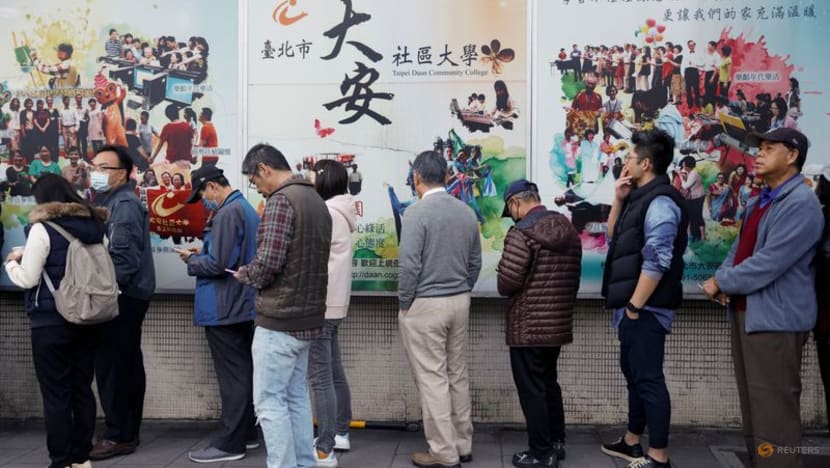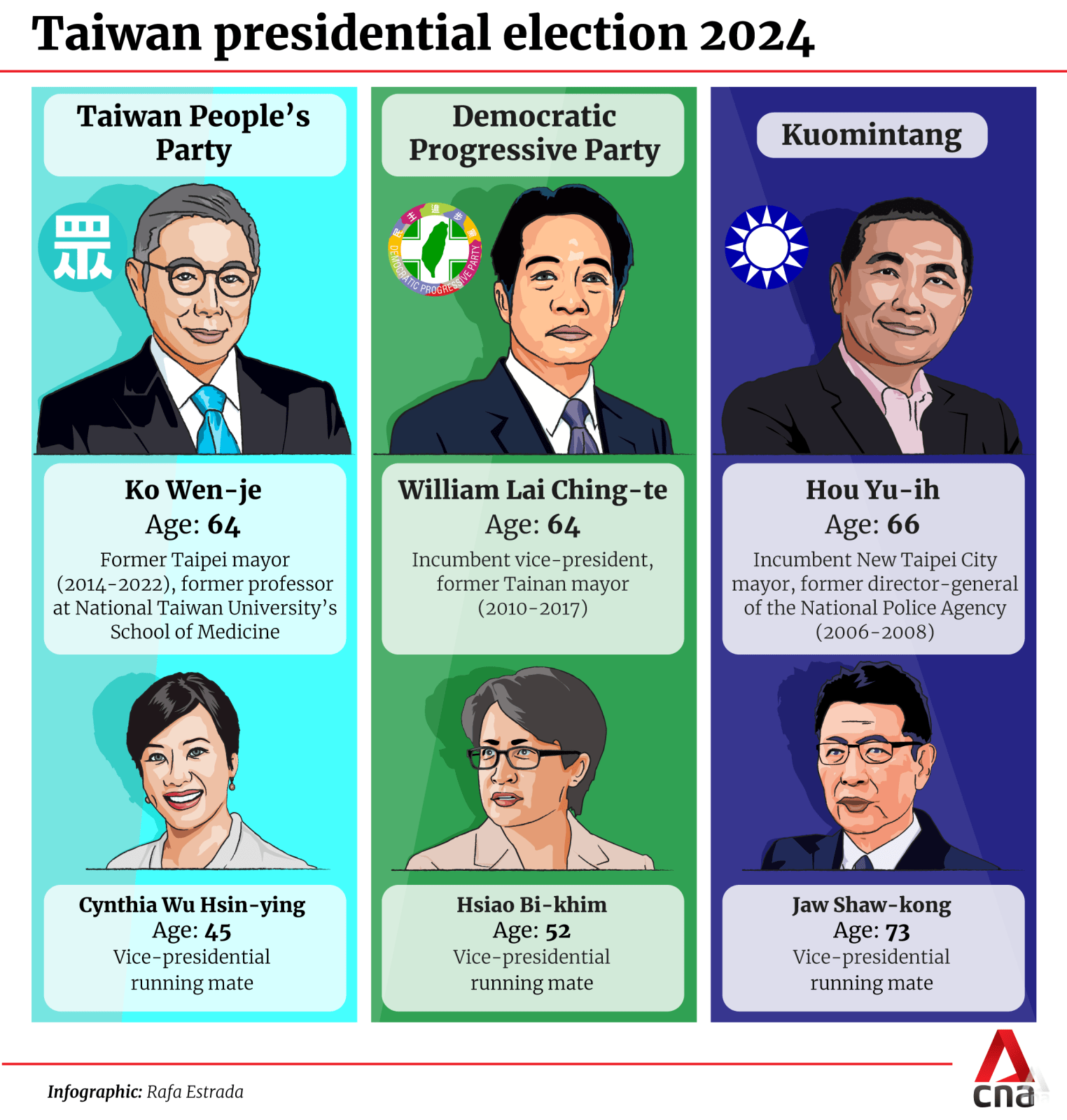Taiwan Votes 2024: Taiwanese head to ballot booths to pick a new president and legislators today. What’s at stake?
Close to 20 million Taiwanese are eligible to vote in this election, which is being closely watched around the world for the implications on the cross-strait relationship as well as the Sino-US rivalry.

People wait for the opening of the polling station to cast their vote, in Taipei, Taiwan on Jan 13, 2024. (Photo: Reuters/Carlos Garcia Rawlins)

This audio is generated by an AI tool.
SINGAPORE/TAIPEI: Taiwan heads to the polls today (Jan 13) to choose its next leader in a high-stakes presidential election that will determine the direction of cross-strait relations with China, as well as regional and even global stability.
Voting opens at 8am local time and closes at 4pm. Results are expected to be out by the end of the day.
It’s a three-way contest in the presidential race - frontrunner Mr Lai Ching-te of the ruling Democratic Progressive Party (DPP) is facing off against Mr Hou Yu-ih from the Kuomintang (KMT), with Dr Ko Wen-je of the Taiwan People’s Party (TPP) also in the fray.
Final opinion polls conducted on Jan 3 have placed DPP presidential candidate Mr Lai in the lead, but the KMT’s Mr Hou follows closely on his heels. While TPP candidate Dr Ko is a distant third, his party could hold the balance of power in the legislature.

President Tsai Ing-wen is ineligible to seek re-election after serving two straight terms.
The hopefuls have been busy through the 28 days of formal campaigning, staging rallies and taking part in televised debates as they seek to win people’s hearts and minds - and secure their votes.
CNA has been on the ground - here are the key issues that have emerged in this election.
CROSS-STRAIT TENSIONS
The issue has been at the forefront as China steps up military and economic pressure on Taiwan. Beijing has framed the election as a choice between war and peace across the Taiwan Strait, as well as between prosperity and recession.
While China has not publicly stated its preferred candidate, it has clearly signalled who’s not in its favour, calling the DPP’s Lai a “separatist” and “troublemaker”.
Mr Lai was previously outspoken in his support for Taiwan independence - which China sees as a red line - but has since distanced himself from this. He has pledged to prioritise the status quo, saying only Taiwan’s people can decide the island’s future.
Mr Hou of the KMT has portrayed the presidential ballot as a choice between war and peace with China, mirroring Beijing’s warning. He has said he will restart talks with China, starting with lower-level events such as cultural exchanges. Still, he rejects Beijing’s “one country, two systems” model of bringing Taiwan under its control.
As for the TPP’s Dr Ko, how exactly he will conduct cross-strait policy remains unclear. He has touted his party as offering a “middle way” between the DPP and KMT on the matter of China, while offering few details.
We talked to analysts to find out the likely trajectories of cross-strait relations under each of the three men, and the best- and worst-case scenarios for Taiwan depending on who takes office.
SECURITY
Like previous elections, defence has remained a key issue, arguably gaining greater prominence this election cycle as an increasingly assertive China looms large.
In a sign of the times, a Chinese satellite launch triggered alarm in Taiwan just earlier this week after authorities sent out an emergency message notifying the public.
An English-language version announced it as “[Air raid alert], Missile flyover Taiwan airspace, be aware”. The island’s defence ministry later apologised, saying the reference to a missile in the message was inaccurate.
The three presidential candidates have all laid out their planned defence policies should they be elected. A common factor is to uphold defence spending, with the TPP’s Dr Ko going further to suggest raising the budget to 3 per cent of the island’s gross domestic product.
Taiwan will see a record-high overall defence budget of NT$606.8 billion (US$19.1 billion) this year, or about 2.5 per cent of its GDP. This would mark the seventh consecutive on-year increase in the island’s defence spending.
The candidates are also aligned on the extension of military conscription to one year, taking effect this month. It’s a rare consensus in a campaign trail which has seen the hopefuls locking horns on an array of issues.
The move has been met with broad public support. Still, reservations have been expressed over perceived lapses in training and equipment. Questions have also been raised over whether longer military service will translate to stronger national defence.
LIVELIHOODS
High property prices. Stagnant wages. As people in Taiwan are faced with these twin realities, failure to provide relief and tackle the cost of living could cost candidates crucial votes in the presidential race.
Properties in the island’s capital Taipei are among the least affordable in the world. Meanwhile, an annual survey last year found that 90 per cent of respondents were “unsatisfied” with their salaries, the highest percentage in five years.
All three hopefuls recognise improving livelihoods as a pivotal issue, with the KMT’s Mr Hou and the DPP’s Mr Lai pledging to raise the minimum wage.
In the meantime, some locals are taking matters into their own hands as CNA finds out - seeking alternatives to a conventional job in the hopes of a better way forward.
TRADE
Trade between Taiwan and China has come under the spotlight amid a growing economic spat. Beijing has signalled it is considering reimposing tariffs on more Taiwanese imports covered by a landmark cross-strait free trade pact, the Economic Cooperation Framework Agreement (ECFA).
China first suspended tariff cuts on 12 chemical products from Taiwan after concluding that the island’s bans on some 2,500 products from the mainland - meant to protect domestic industries - violate both ECFA and World Trade Organization rules.
Beijing is now exploring similar action on more Taiwanese goods in sectors such as agriculture, fishery and textiles.
The prospect has taken on a political dimension, coming so close to the island’s presidential election, but the stakes are high for Taiwan, with analysts warning of damage to the Taiwan economy in the long term should the move materialise.
There is also uncertainty over China’s next step, which is likely to differ based on who Taiwan elects as president considering each of the contenders represents a different way forward for cross-strait relations.
IDENTITY
Taiwanese, Chinese, or both? While not the dominant issue this election, identity has remained central to politics in Taiwan, although it has played out in a slightly different fashion.
The majority of voters going into today’s poll now identify as Taiwanese, in a shift which has taken place over the last three decades. Political and social flashpoints have driven the change, coupled with gradual changes like curriculum reform.
Even so, the distinction between islander (benshengren) and mainlander Taiwanese (waishengren) - referring to those who descend from natives or migrants who fled from the mainland respectively - remains salient, with the spotlight being cast on the candidates’ backgrounds.
The issue of nationality has also been entangled with identity in this election. There has been speculation over the nationalities, and hence loyalties, of two vice-presidential candidates - Ms Hsiao Bi-khim of the DPP, and Ms Cynthia Wu of the TPP.
Dual nationals are barred from running for president or vice-president under Taiwanese law. In early December, Ms Hsiao and Ms Wu’s nationalities became fodder for online speculation, with rumours that both candidates still held US citizenship.
You can read the full story here.
FROM YOUNG TO OLD
Younger Taiwanese voters have drawn significant attention in the lead-up to the presidential and legislative polls, dominating headlines and drawing multiple policy pledges from political parties and their candidates.
Youths aged between 20 (Taiwan’s legal voting age) and 34 make up about one-fifth of the island’s 23.6 million population. While youth turnout at elections has been typically lower compared to other age groups, they can still make an impact.
This was seen in the 2020 ballot, when they turned up in force with a showing of over 70 per cent and helped President Tsai Ing-wen secure a second term in office.
But what do young people really want from this presidential election and beyond, and what will influence their vote this Polling Day? CNA spoke to several youths to get their perspectives, which you can read about here.
As for middle-aged and older voters, they’ve largely been under the radar this election despite making up over half of the electorate.
Analysts say this is partly because the majority of older voters - especially those with jobs - mainly care about stability and peace, so the presidential candidates might not be focusing their energies on this group as much.
That being said, there are major issues affecting older voters which will have a wider impact, considering Taiwan is on course to become a super-aged society by 2026.
From the prospect of labour insurance pension reforms to the growing care needs of seniors - CNA finds out what exactly older Taiwanese want, even as they are content to be low-key in the elections.
LEGISLATURE
Voters will not just be picking a new leader, but also 113 legislators for a new parliament.
While not as closely watched as the presidential poll, the legislative elections could have significant consequences - especially if the outcome is a hung parliament as some analysts predict.
With the DPP widely expected to lose its majority in the Legislative Yuan and the KMT likely to improve its standing while still falling short of a majority, this means the TPP would have the balance of power.
In this scenario, the TPP is expected to play both sides of the aisle according to the issues at hand, setting the stage for more parliamentary contestation at a crucial time.
Taiwan’s legislature is likely to hold crucial debates on labour insurance reform after the polls, as well as pick up on election promises ranging from education policy to youth housing policy.
Gridlock in parliament would potentially stall the passage of key laws, posing a major challenge for the government of the day in seeing through its policies and agenda.





















